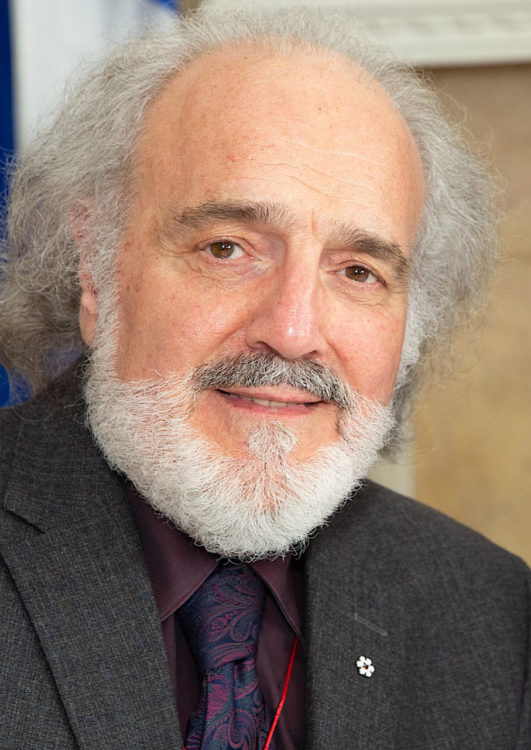
One of Canada’s preeminent composers, John Rea has filled a catalogue of nearly 80 original works encompassing chamber music, vocal genres, symphonic works, ballet, music theatre, opera and electroacoustic music. His music has been performed by ensembles around the world, including Canada, the United States, Argentina, France, Germany, Switzerland and Austria.
It’s been a long, wonderful journey for Rea who, as a young boy in Toronto, used to practice his scales on a keyboard made of paper.
Today, Rea, Professor Emeritus at the Schulich School of Music, marked another leg of that journey as he was honoured during Fall 2020 Convocation ceremonies as one of three winners of the McGill Medal for Exceptional Academic Achievement.
“Music started early for me as a child. I learned, if that’s the right word, how to ‘play’ the piano on a paper keyboard when I was about five or six years old. The keys, both black and white, had been drawn to size on oblong stiff paper showing about three octaves,” he says. “The Conservatory in Toronto employed this teaching method with children whose families didn’t own a piano. I was taught to identify the note middle C by calling it Baby C.”
Rea doesn’t come from a musical family (“Only my father received some very rudimentary musical training. He played the trumpet in a village band as a teenager in Italy”). Nevertheless, his family bought a piano when Rea was seven or eight years old. And with that, the endless possibilities of music were opened to him.
“The studio grand piano (called a ‘baby grand’) occupied a big place in a small living room. And the object, unlike hand-held musical instruments, reigned over its space… perhaps a bit daunting for a young child,” he says. “But I knew then that the complete gamut of music itself lay before me. That was certainly fun.”
The power of creation
Rea took piano lessons throughout elementary and high school, and was pursuing a bachelor’s degree in piano when he decided to take an elective course in composition.
“In a way, I was returning to an avocation begun as a child when letting my hands roam over an extensive keyboard truly delighted me, and when I composed my first little works,” he says. “Thanks to the lessons given in that course, my sonic chaos slowly gave way to a sense of cosmos, orderliness, and form. Energy became unlocked, and I found new power as a burgeoning composer.”
Toward the end of his doctoral studies in composition and music theory at Princeton University in 1972, Rea met a recent graduate of McGill’s Faculty of Music (later the Schulich School of Music) who told him about an opening at the Faculty. Rea applied and was “ecstatic” to land a one-year position.
“To my surprise during that wonderful year in Montreal, a new tenure-track opened. And, both then and now, the honour to have received the confidence and support of my colleagues — who chose me to move forward at McGill — touches me profoundly,” he says.
Since that first year in 1973 until his retirement in 2019, Rea taught composition, music history and music theory to hundreds of students. His composition students include more than 20 supervisees who have gone on to prestigious academic or professional positions in Canada, the United States, Europe, and South America, with professorships in composition, music technology, and conducting.
Making it to Carnegie Hall
Rea also served as Dean of the Faculty of Music from 1986-1991. One of the real feathers in his cap during his tenure as Dean was arranging for the McGill Symphony Orchestra to perform at historic Carnegie Hall in 1989 – a first for a Canadian student orchestra.
Among his many awards and distinctions, Rea was granted the Jules Léger Prize for New Chamber Music in 1981 and 1992; the Prix Opus, Compositeur de l’année in 2005; and the Prix Serge-Garant, Fondation Émile-Nelligan in 2006.
The Société de musique contemporaine du Québec dedicated its annual Homage Series to Rea for its 2015-2016, with concerts presenting his works throughout the year. The Homage Series to Rea drew in excess of 35,000 attendees in more than 80 concerts and activities, including three days of activities and conferences about Rea’s life and works hosted by the Schulich School of Music.
Looking back
Asked to look back at his career and list some of its highlights, Rea doesn’t include the prizes or accolades. Instead he remembers moments from his work as a composer, a teacher and an administrator. “I am very proud of a number of my compositions — a string quartet, a set of pieces for piano solo, orchestral and chamber music, together with orchestrations and re-orchestrations,” he says.
“As a teacher, I was graced with many excellent students who have gone on to wonderful careers both in and out of academia. And many initiatives taken as Dean of a Faculty long ago, some still in place at the School today, make me happy – such as performance training in orchestral instruments, or the Dean’s Essay Prize. And recalling our symphony orchestra’s appearance at Carnegie Hall in 1989 brings even now a smile to my ears, if you can muse upon such a cross-modal exploit.”
This year marks the centennial anniversary of the establishment of the Faculty of Music at McGill, although Rea is quick to point out that the University had exercised “great foresight” by founding the McGill Conservatorium of Music 16 years prior, in 1904. “This is our hundred and sixteenth birthday,” he says. “In recent time, music at McGill has truly flourished thanks to the farsighted philanthropic work of Seymour Schulich and Elizabeth Wirth, for which everyone is exceedingly grateful. Seeing and listening ahead, quintessential musical abilities, marks for me both the exceptional past of our School as well as its illustrious future.”
